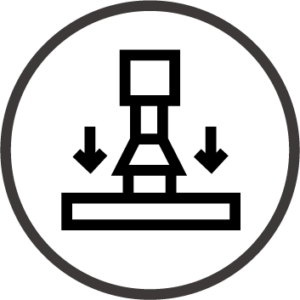Coating Evaluation
Coating evaluations are essential for maintaining the integrity and performance of protective coatings on various surfaces. They help identify potential issues such as chemical degradation, inadequate thickness, and adhesion failure before they become significant problems. They also ensure that coatings continue to provide effective protection against environmental and operational challenges.
Key Aspects of Coating Evaluations
Here are the common coating evaluation aspects that ensure the application's effectiveness and longevity:
Adhesion testing
Adhesion testing measures how well a coating adheres to the substrate it is applied to. This is crucial for ensuring that the material will not peel or flake off, compromising the protection it provides. Identifying adhesion issues helps prevent costly failures and guarantees the coating performs as intended.
Visual Inspection
Visual inspection involves a detailed examination of the coating's surface to identify any visible defects or signs of deterioration. This includes searching for cracks, blisters, discoloration, and other anomalies that may indicate underlying issues.
Thickness Measurement
Thickness measurement determines the depth of the coating layer applied to a surface. Accurate thickness is vital for ensuring the coating provides adequate protection against environmental factors like corrosion, UV exposure, and mechanical wear.
Chemical Resistance Testing
Chemical resistance testing evaluates how well a coating withstands exposure to different chemicals and corrosive substances. This is particularly critical in industrial environments where materials are regularly exposed to harsh chemicals.
Adhesion Strength Testing
Adhesion strength testing quantifies the force required to detach the coating from the substrate. This test is more rigorous than basic adhesion testing and provides a deeper understanding of the coating's ability to handle stress and impact.
Frequently Asked Questions (FAQs)
Here are some FAQs to help you understand the importance and process of coating assessments:
Why is coating evaluation is important?
Coating evaluation helps guarantee that protective coatings perform as intended. They identify potential problems such as adhesion failure, incorrect thickness, and chemical degradation before they lead to costly repairs or failures.
How Long Does the Process Take?
Typically, coating assessments can take a few hours to a full day. The process might extend over several days for larger or more intricate projects to guarantee a thorough and accurate evaluation.
How Often Should I Have an Evaluation Done?
Coating evaluation helps guarantee that protective coatings perform as intended. They identify potential problems such as adhesion failure, incorrect thickness, and chemical degradation before they lead to costly repairs or failures.
What Happens if Issues Are Found During the Evaluation?
Coating evaluation helps guarantee that protective coatings perform as intended. They identify potential problems such as adhesion failure, incorrect thickness, and chemical degradation before they lead to costly repairs or failures.
Please call me at (832) 526-2126 and give me a chance to EARN your business.
You can also email me at blake.landry@bliinspection.com
I WORK HARD FOR YOU!
Blake Landry
Member: ISN-DISA-NCCER-AMPP/NACE





